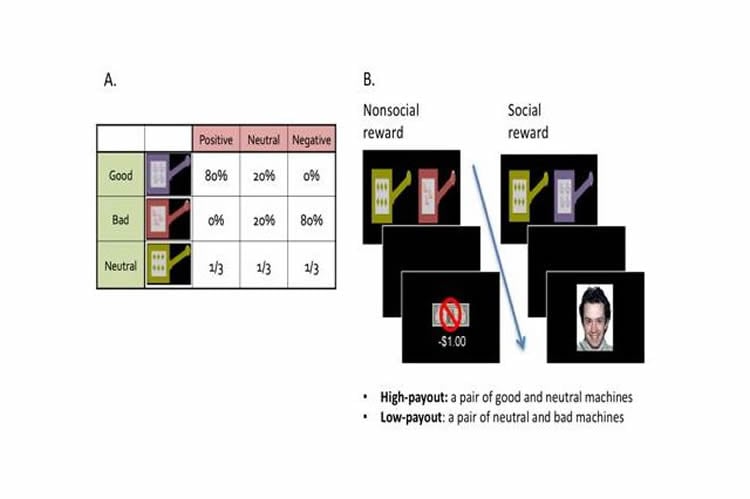Summary: A neuroimaging study conducted by researchers from UCLA reveals the brains of people with schizophrenia are less sensitive to social rewards than they are to non-social rewards.
Source: UCLA.
In imaging studies, UCLA researchers found that the brains of people with schizophrenia are less sensitive to social rewards, such as the positive feelings that can come from social interactions with people, than they are to so-called nonsocial rewards, such as money or objects.
People generally find social stimulation rewarding, which in turn motivates them to seek more social interactions. Conversely, in people with schizophrenia, abnormalities in how the brain processes social rewards likely contribute to human interaction problems. One of the hallmarks of schizophrenia is the impairment of social function, which includes the ability to conduct everyday conversations and maintain relationships with other people.
METHOD
To study the brain’s response to different stimuli, researchers recruited 27 people with clinically stable schizophrenia and 25 healthy individuals. They were asked to complete a task while in a functional magnetic resonance imaging, or fMRI, scanner. Functional MRI scans look at blood flow in the brain to detect areas of activity.
The task was to play a computerized version of a slot machine, or “one-armed bandit.” There were two categories of payouts, images of dollar bills or of happy human faces. Researchers asked the participants to evaluate which machines had the best “payouts” in each category.

When comparing machines that gave dollar-bill payouts, levels of activity in the brain were similar in people with and without schizophrenia. However, when comparing machines that gave payouts of human smiling faces, the level of activity in the brain was much lower in people with schizophrenia than in healthy individuals.
IMPACT
The findings provide additional evidence of disrupted social rewards processing in people with schizophrenia, researchers say. The next project is to perform the test in patients who have experienced their first psychotic episode to see how their reactions to social rewards change.
The study’s first author is Junghee Lee, a research psychologist at UCLA; the senior author is Michael Green, a professor in residence in the department of psychiatry and biobehavioral sciences at the Semel Institute for Neuroscience and Human Behavior at the David Geffen School of Medicine at UCLA. The other authors are William Horan, Eric Reavis and Jonathan Wynn, all of UCLA and the VA Greater Los Angeles Healthcare System.
Funding: The National Institute of Mental Health and the Brain & Behavior Research Foundation supported this work.
Source: Leigh Hopper – UCLA
Publisher: Organized by NeuroscienceNews.com.
Image Source: NeuroscienceNews.com image is adapted from the UCLA news release.
Original Research: Abstract for “Reduced Neural Sensitivity to Social vs Nonsocial Reward in Schizophrenia” by Junghee Lee, Amy M Jimenez, Eric A Reavis, William P Horan, Jonathan K Wynn, and Michael F Green. in Schizophrenia Bulletin. Published Spetember 5 2018.
doi:10.1093/schbul/sby109
[cbtabs][cbtab title=”MLA”]UCLA”Brains of People with Schizophrenia Are Less Reactive to Social Rewards Like Smiling Faces.” NeuroscienceNews. NeuroscienceNews, 11 September 2018.
<https://neurosciencenews.com/schizophrenia-smiling-reward-9837/>.[/cbtab][cbtab title=”APA”]UCLA(2018, September 11). Brains of People with Schizophrenia Are Less Reactive to Social Rewards Like Smiling Faces. NeuroscienceNews. Retrieved September 11, 2018 from https://neurosciencenews.com/schizophrenia-smiling-reward-9837/[/cbtab][cbtab title=”Chicago”]UCLA”Brains of People with Schizophrenia Are Less Reactive to Social Rewards Like Smiling Faces.” https://neurosciencenews.com/schizophrenia-smiling-reward-9837/ (accessed September 11, 2018).[/cbtab][/cbtabs]
Abstract
Reduced Neural Sensitivity to Social vs Nonsocial Reward in Schizophrenia
Background
Human beings find social stimuli rewarding, which is thought to facilitate efficient social functioning. Although reward processing has been extensively studied in schizophrenia, a few studies have examined neural processes specifically involved in social reward processing. This study examined neural sensitivity to social and nonsocial rewards in schizophrenia.
Methods
Twenty-seven patients with schizophrenia and 25 community controls completed a One-Armed Bandit Task, an implicit reinforcement learning task, in the scanner. There were 2 conditions with an identical trial structure, one with social rewards and the other with nonsocial rewards. The data were analyzed using a region of interest (ROI) approach, focusing on the ventral striatum, ventromedial prefrontal cortex, and anterior cingulate cortex.
Results
Across all 3 ROIs, patients showed reduced activation for social rewards compared to controls. However, the 2 groups showed comparable levels of activation for nonsocial rewards. Within the patient group, levels of neural activation in these ROIs during the social reward condition were associated with better performance.
Conclusions
This study found reduced neural sensitivity in patients with schizophrenia in key reward-processing regions for social but not for nonsocial rewards. These findings suggest a relatively specific social reward-processing deficit in schizophrenia during an implicit reinforcement learning task.






